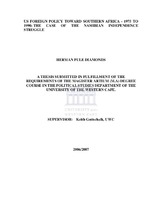| dc.contributor.advisor | Gottschalk, Keith | |
| dc.contributor.author | Diamonds, Herman Pule | |
| dc.contributor.other | Dept. of Political Studies | |
| dc.contributor.other | Faculty of Economics and Management Sciences | |
| dc.date.accessioned | 2013-10-30T07:08:22Z | |
| dc.date.available | 2009/10/28 10:49 | |
| dc.date.available | 2009/10/28 | |
| dc.date.available | 2013-10-30T07:08:22Z | |
| dc.date.issued | 2007 | |
| dc.identifier.uri | http://hdl.handle.net/11394/2387 | |
| dc.description | Magister Artium - MA | en_US |
| dc.description.abstract | This study, in contrast to contemporary held views relating to the US policy premises, aimed to look at the inherent disabilities and inconsistencies of the policies of successive Washington administrations. More so, it investigated the US interventionist strategies to perceived threats from communist regimes and their allies, especially in Southern Africa. To be able to embark on such an investigation, Namibia and the Soviet-Cuban involvement in Southern Africa were selected as a special focus of this study. | en_US |
| dc.language.iso | en | en_US |
| dc.publisher | University of the Western Cape | en_US |
| dc.subject | United States (US) | en_US |
| dc.subject | Namibia | en_US |
| dc.subject | Angola | en_US |
| dc.subject | USSR | en_US |
| dc.subject | Cuba | en_US |
| dc.subject | Cold War | en_US |
| dc.subject | Apartheid | en_US |
| dc.subject | Independence struggles | en_US |
| dc.subject | Foreign policy | en_US |
| dc.subject | Identities | en_US |
| dc.title | US foreign policy toward Southern Africa - 1975 to 1990: the case of the Namibian Independence struggle | en_US |
| dc.type | Thesis | en_US |
| dc.rights.holder | University of the Western Cape | en_US |
| dc.description.country | South Africa | |

